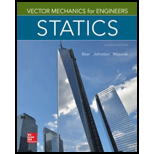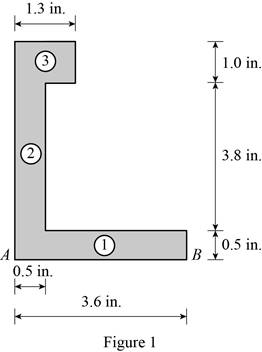
Concept explainers
Find the moment of inertia
Answer to Problem 9.44P
The moment of inertia
Explanation of Solution
Calculation:
Show the area with parts of the section as Figure 1.

Calculate the centroid of the area as in Table 1.
| Section | Area, A |
|
| ||
| 1 | 3.24 | 0.45 | |||
| 2 | 0.475 | 4.56 | |||
| 3 | 0.845 | 6.24 | |||
| Total | 5.0 | 4.560 | 11.25 |
Calculate the centroid of the area with respect to x axis
Substitute
Calculate the centroid of the area with respect to y axis
Substitute
Consider the x axis.
Consider the section 1.
Calculate the moment of inertia of section 1
Calculate the centroid of section 1
Substitute 2.25 in. for
Calculate the moment of inertia of section 1
Substitute
Consider the section 2.
Calculate the moment of inertia of section 2
Calculate the centroid of section 2
Substitute 2.25 in. for
Calculate the moment of inertia of section 2
Substitute
Consider the section 3.
Calculate the moment of inertia of section 3
Calculate the centroid of section 3
Substitute 2.25 in. for
Calculate the moment of inertia of section 3
Substitute
Calculate the moment of inertia of entire section
Substitute
Consider the y axis.
Consider the section 1.
Calculate the moment of inertia of section 1
Calculate the centroid of section 1
Substitute 0.912 in. for
Calculate the moment of inertia of section 1
Substitute
Consider the section 2.
Calculate the moment of inertia of section 2
Calculate the centroid of section 2
Substitute 0.912 in. for
Calculate the moment of inertia of section 2
Substitute
Consider the section 3.
Calculate the moment of inertia of section 3
Calculate the centroid of section 3
Substitute 0.912 in. for
Calculate the moment of inertia of section 3
Substitute
Calculate the moment of inertia of entire section
Substitute
Therefore, the moment of inertia
Want to see more full solutions like this?
Chapter 9 Solutions
Vector Mechanics for Engineers: Statics, 11th Edition
 Elements Of ElectromagneticsMechanical EngineeringISBN:9780190698614Author:Sadiku, Matthew N. O.Publisher:Oxford University Press
Elements Of ElectromagneticsMechanical EngineeringISBN:9780190698614Author:Sadiku, Matthew N. O.Publisher:Oxford University Press Mechanics of Materials (10th Edition)Mechanical EngineeringISBN:9780134319650Author:Russell C. HibbelerPublisher:PEARSON
Mechanics of Materials (10th Edition)Mechanical EngineeringISBN:9780134319650Author:Russell C. HibbelerPublisher:PEARSON Thermodynamics: An Engineering ApproachMechanical EngineeringISBN:9781259822674Author:Yunus A. Cengel Dr., Michael A. BolesPublisher:McGraw-Hill Education
Thermodynamics: An Engineering ApproachMechanical EngineeringISBN:9781259822674Author:Yunus A. Cengel Dr., Michael A. BolesPublisher:McGraw-Hill Education Control Systems EngineeringMechanical EngineeringISBN:9781118170519Author:Norman S. NisePublisher:WILEY
Control Systems EngineeringMechanical EngineeringISBN:9781118170519Author:Norman S. NisePublisher:WILEY Mechanics of Materials (MindTap Course List)Mechanical EngineeringISBN:9781337093347Author:Barry J. Goodno, James M. GerePublisher:Cengage Learning
Mechanics of Materials (MindTap Course List)Mechanical EngineeringISBN:9781337093347Author:Barry J. Goodno, James M. GerePublisher:Cengage Learning Engineering Mechanics: StaticsMechanical EngineeringISBN:9781118807330Author:James L. Meriam, L. G. Kraige, J. N. BoltonPublisher:WILEY
Engineering Mechanics: StaticsMechanical EngineeringISBN:9781118807330Author:James L. Meriam, L. G. Kraige, J. N. BoltonPublisher:WILEY





